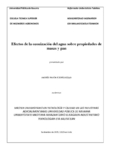Mostrar el registro sencillo del ítem
Efectos de la ozonización del agua sobre propiedades de masas y pan
| dc.creator | Pavón Rodríguez, Andrés | es_ES |
| dc.date.accessioned | 2016-05-06T14:29:20Z | |
| dc.date.available | 2020-10-01T23:00:10Z | |
| dc.date.issued | 2015 | |
| dc.identifier.uri | https://hdl.handle.net/2454/20516 | |
| dc.description.abstract | The aim of this study was to determine the effect of ozone in doughs and breads made with ozonated water. Different treatments were analyzed, control with an improver that included ascorbic acid (CM), control without improver (C) and 4 different doses of ozone in water: Oz1 (0.47-0.48 ppm); Oz2 (0.64-0.68 ppm); Oz3 (0.89-0.91 ppm); Oz4 (> 2 ppm). The results have shown that high doses of ozone (Oz4) in the doughs caused a decrease in the maximum height of the doughs during fermentation (Hm, measured with a Rheofermentometer) and in their alveograhic properties strength (W) and tenacity (P), causing a decrease in their ability to maintain the desired shape (height and lenght) of the bread. This might be due to excessive oxidation of gluten proteins. Furthermore, the breads obtained from these doughs showed higher values in hardness, gumminess, chewiness and a lower cohesiveness values and, after 24 h, a faster staling process than the control breads. Medium doses of ozone in water (0.30-0.80 ppm) provided bread more similar than control samples for texture properties. Beside this, it was observed that the kneading time could be decreased because the development time of the doughs made with ozone was faster than controls. Varying this kneading time (using 0.80 ppm ozonated water) it was found that Hm in doughs, height and length as well as hardness, gumminess, chewiness and cohesiveness at 0 and 24 h of the bread resembled those of the doughs and control breads kneading with standard times. The results of this work indicate that the use of ozonated water may be a useful alternative to the addition of chemical oxidants to the bread dough. For this to be effective, it seems to be necessary to use moderate doses of ozone and adjust the intensity and time of dough mixing. | es_ES |
| dc.format.mimetype | application/pdf | en |
| dc.language.iso | spa | en |
| dc.subject | Ozone | es_ES |
| dc.subject | Oxidant | es_ES |
| dc.subject | Bread | es_ES |
| dc.subject | Doughs | es_ES |
| dc.subject | Breadmaking | es_ES |
| dc.title | Efectos de la ozonización del agua sobre propiedades de masas y pan | es_ES |
| dc.type | Trabajo Fin de Máster/Master Amaierako Lana | es |
| dc.type | info:eu-repo/semantics/masterThesis | en |
| dc.date.updated | 2016-01-22T10:50:39Z | |
| dc.contributor.affiliation | Escuela Técnica Superior de Ingenieros Agrónomos | es_ES |
| dc.contributor.affiliation | Nekazaritza Ingeniarien Goi Mailako Eskola Teknikoa | eu |
| dc.description.degree | Máster Universitario en Tecnología y Calidad en las Industrias Agroalimentarias por la Universidad Pública de Navarra | es_ES |
| dc.description.degree | Nekazaritzako Elikagaien Industrietako Teknologiako eta Kalitateko Unibertsitate Masterra Nafarroako Unibertsitate Publikoan | eu |
| dc.rights.accessRights | info:eu-repo/semantics/openAccess | en |
| dc.rights.accessRights | Acceso abierto / Sarbide irekia | es |
| dc.embargo.terms | 2020-10-01 | es_ES |
| dc.contributor.advisorTFE | Arozarena Martinicorena, Íñigo | es_ES |


